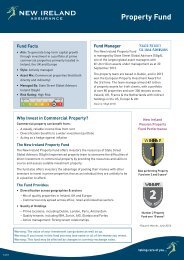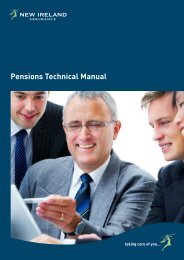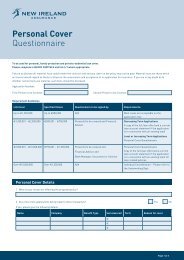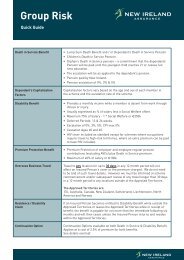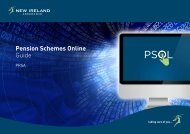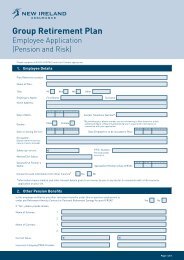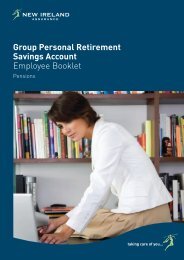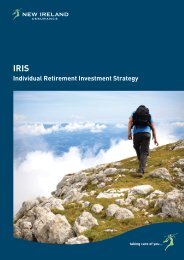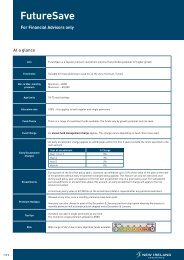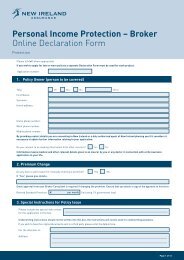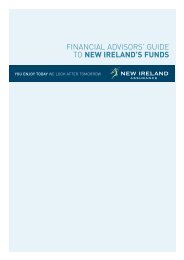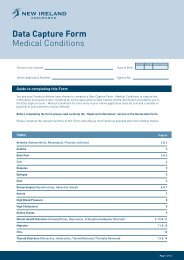Trustee Training Guide - New Ireland Assurance
Trustee Training Guide - New Ireland Assurance
Trustee Training Guide - New Ireland Assurance
Create successful ePaper yourself
Turn your PDF publications into a flip-book with our unique Google optimized e-Paper software.
<strong>Trustee</strong> <strong>Training</strong> <strong>Guide</strong><br />
For Executive Pension Plan
Contents<br />
Appropriate <strong>Trustee</strong> <strong>Training</strong> 2<br />
<strong>Trustee</strong>ship 3<br />
Investment 5<br />
Member Communication 6<br />
Administration 7<br />
Compliance and Regulation 10<br />
<strong>Trustee</strong> Declaration 12<br />
1
Appropriate <strong>Trustee</strong> <strong>Training</strong><br />
This Executive Pension Plan <strong>Trustee</strong> <strong>Training</strong><br />
<strong>Guide</strong> has been prepared by <strong>New</strong> <strong>Ireland</strong><br />
<strong>Assurance</strong> Company plc (<strong>New</strong> <strong>Ireland</strong>) to assist<br />
trustees of <strong>New</strong> <strong>Ireland</strong>’s Executive Pension<br />
Plans satisfy the requirement for pension scheme<br />
trustees to be appropriately trained.<br />
This <strong>Guide</strong> takes into account that the duties and<br />
responsibilities of a one member arrangement<br />
are not necessarily as demanding as those of a<br />
group scheme. In addition <strong>New</strong> <strong>Ireland</strong> currently<br />
assist trustees in carrying out many of the duties<br />
that are the responsibility of a trustee as part of<br />
its insured service e.g. provision of information,<br />
investment of contributions, payment of benefits<br />
etc.<br />
Legal Requirement for <strong>Trustee</strong> <strong>Training</strong><br />
1. With effect from 1st February 2010 all<br />
trustees, including the trustees of an<br />
Executive Pension Plan, must undergo what<br />
is described in legislation as “appropriate<br />
trustee training”. Failure to comply with<br />
this duty can result in an on-the-spot fine<br />
of €2,000 per trustee as well as having to<br />
undergo appropriate trustee training.<br />
to receive appropriate training. Failure to<br />
arrange the training can result in prosecution.<br />
What is Appropriate <strong>Trustee</strong> <strong>Training</strong>?<br />
The Pensions Board have approved the booklet<br />
approach to trustee training for Executive Pension<br />
Plans. We believe you will have completed<br />
appropriate training if you fully read and<br />
understand this <strong>Trustee</strong> <strong>Training</strong> <strong>Guide</strong>.<br />
At the back of this booklet you will find a<br />
Declaration which you should sign and date when<br />
you have read and understood the contents of<br />
this <strong>Guide</strong>. You may need to produce proof to the<br />
Pensions Board in the future that you have read<br />
and understood this booklet so please remember<br />
to keep your signed declaration in a safe place.<br />
2. For <strong>Trustee</strong>s appointed before 01/02/2010, the<br />
initial training needed to be completed before<br />
01/02/2012, while for new trustees the training<br />
will need to be completed within 6 months of<br />
their appointment. All trustees must repeat<br />
their training every 2 years.<br />
3. Where individual trustees have been<br />
appointed, it will be necessary for each trustee<br />
to complete the training.<br />
4. Where a company is acting as the trustee,<br />
then it will be necessary for all the directors<br />
of that company to complete the training.<br />
5. The employer must arrange for the trustees<br />
2
<strong>Trustee</strong>ship<br />
One of the many advantages of setting up an<br />
Executive Pension Plan for a director or key staff<br />
member is to avail of the tax benefits attaching to<br />
such a plan. Under current legislation a Revenue<br />
approved plan provides for:<br />
• tax-free investment growth*,<br />
• corporation tax relief on the employer’s<br />
contributions<br />
•no benefit-in-kind for the member in respect of<br />
the employer contributions<br />
• income tax relief on any member contributions<br />
*A government levy (currently 0.6% per annum<br />
until 2014) applies on all pension funds.<br />
One of the requirements for Revenue approval is<br />
the plan must be set up under trust.<br />
What is a Trust?<br />
A trust is a legal arrangement under which<br />
property is held, managed and controlled by<br />
chosen individuals or in some cases companies<br />
who act as trustees, for the benefit of the<br />
beneficiaries, in this case, members of the plan.<br />
The trust ensures that the pension plan’s assets<br />
are kept legally separate from the employer’s<br />
business assets, thereby affording greater<br />
security to the member of the plan. A trustee may<br />
also be a beneficiary.<br />
In the case of a <strong>New</strong> <strong>Ireland</strong> Executive<br />
Pension Plan “the property” is the value of the<br />
contributions paid by the employer and employee<br />
and invested in a policy with <strong>New</strong> <strong>Ireland</strong><br />
<strong>Assurance</strong>, which becomes the pension fund or<br />
assets of the plan.<br />
Parties to a Trust<br />
The employer sets up the trust and appoints the<br />
trustees.<br />
A beneficiary is any person entitled to a benefit<br />
from the plan now or in the future - essentially<br />
the member and his/her dependants.<br />
The trustees may be individuals, a company or<br />
generally an employer, but acting in a separate<br />
capacity, who hold the plan in trust for the<br />
beneficiaries. If there are individuals acting as<br />
trustees there must be a minimum of two. An<br />
Irish Company can usually act as sole trustee<br />
– provided this is permitted by the company’s<br />
Memorandum and Articles of Association (which<br />
should be checked before a company becomes a<br />
trustee).<br />
As a trustee, Trust Law and Pensions Law<br />
require you use the property for the benefit of<br />
the beneficiary and not for your own benefit.<br />
You are in charge of the Pension Plan and are<br />
responsible for ensuring that it is run properly<br />
and the member’s benefits are secure. <strong>New</strong><br />
<strong>Ireland</strong> will assist you in this regard.<br />
Who cannot be a <strong>Trustee</strong>?<br />
The Pensions Act, 1990 does not allow the<br />
following individuals to act as trustees:<br />
• an undischarged bankrupt<br />
• someone who has made an arrangement with<br />
their creditors and has not discharged their<br />
obligations<br />
• someone convicted of an offence involving fraud<br />
or dishonesty<br />
• someone not allowed to form or promote a<br />
company for a period of time<br />
• someone who is a director of a Company and<br />
that Company is any of the above<br />
3
Your Duties as a <strong>Trustee</strong><br />
Your duties as a trustee fall into three main<br />
categories as follow:<br />
• general duties under Trust Law, and<br />
• specific duties under the Pensions Act, 1990,<br />
the Taxes Consolidation Act 1997 and other<br />
legislation, and also<br />
• duties under the plan’s own Letter of Exchange<br />
and Rules<br />
The Pensions Act, 1990 is the overriding legislation<br />
for pension schemes and its provisions must apply<br />
even if they conflict with the plan’s own Letter of<br />
Exchange and Rules.<br />
This list summarises your main trustee duties:<br />
• Act in accordance with your plan’s Letter of<br />
Exchange and Rules;<br />
• Act in the best interest of beneficiaries;<br />
• Act impartially, honestly, responsibly and<br />
prudently;<br />
• Keep records;<br />
• Obtain professional advice where needed;<br />
Pension Plan Documents<br />
One of your first duties as a trustee is to<br />
familiarise yourself with the Letter of Exchange<br />
and Rules.<br />
An Executive Pension Plan is established by a<br />
written Letter of Exchange where the employer<br />
notifies the employee concerned that a pension<br />
plan is being set up for him or her. The Letter<br />
of Exchange will record the employer’s name,<br />
the names of the trustees and the date the trust<br />
started<br />
In addition to the Letter of Exchange there is<br />
a set of Rules, which govern such matters as<br />
contributions and benefits payable and also sets<br />
out your trustee powers.<br />
With a <strong>New</strong> <strong>Ireland</strong> plan the pension policy is<br />
generally the only asset in the plan. The policy<br />
document will contain information, which is<br />
specific to your plan. If there is life cover in<br />
place on the member’s life, <strong>New</strong> <strong>Ireland</strong> will<br />
have issued a separate term assurance policy<br />
document.<br />
• Maintain confidentiality;<br />
• Be aware of conflicts of interest;<br />
• Pay benefits promptly.<br />
• Collect and remit contributions promptly.<br />
• Provide annual benefit statements to<br />
and answer information requests from<br />
beneficiaries.<br />
The Taxes Consolidation Act 1997 deals with the<br />
tax aspects of the pension plan and the benefits it<br />
may provide.<br />
<strong>Trustee</strong> Liability<br />
Trust law is there to protect trustees who<br />
carry out their duties and who act carefully and<br />
diligently at all times. As a trustee you can be<br />
sued for breach of trust if you act outside of the<br />
powers provided in the Letter of Exchange and<br />
Rules or you fail to carry out your duties. However,<br />
all trustees can be sued in respect of the actions<br />
of one trustee.<br />
<strong>Trustee</strong> Meetings<br />
The Pensions Board <strong>Trustee</strong> Handbook<br />
recommends that the <strong>Trustee</strong>s of a pension plan<br />
should meet at a very minimum of once a year.<br />
Minutes should be kept of any issue relating to the<br />
pension plan.<br />
4
Investment<br />
A member’s ultimate retirement benefits depend<br />
heavily on investment decisions made. Under<br />
a <strong>New</strong> <strong>Ireland</strong> Executive Retirement Plan. The<br />
trustees can offer the member the option of<br />
‘member’s investment choice’. The member can<br />
select from the full range of investment funds<br />
made available by the trustees.<br />
Where the member chooses his/her own<br />
investment fund(s), you, as a trustee have<br />
a statutory indemnity in relation to fund<br />
performance provided the plan allows for member<br />
choice and subject to the member being provided<br />
with sufficient information to allow them make an<br />
informed decision.<br />
Default Investment Strategy<br />
For any member who does not choose or does not<br />
want to choose an investment fund, contributions<br />
are invested in the current default investment<br />
fund under the Executive Pension Plan.<br />
Typically, it will be a Lifestyle Investment strategy<br />
such as IRIS or Consensus IRIS. The asset<br />
allocation applicable to the member charges<br />
as the member approaches retirement but this<br />
option may not be suitable if the member wants to<br />
invest in an Approved Retirement Fund (ARF).<br />
There is a range of funds available under the plan<br />
which cater for different attitudes to risk. The<br />
range includes funds ranging from low risk to very<br />
high risk.<br />
<strong>New</strong> <strong>Ireland</strong> provide, through their website<br />
and on request, booklets and other<br />
information on the funds available for<br />
investment. It is important that the member<br />
has access to up-to-date information on <strong>New</strong><br />
<strong>Ireland</strong>’s Investment funds, available on our<br />
website. The latest fund performance details<br />
and asset allocations can be found in the<br />
Investment Centre of the <strong>New</strong> <strong>Ireland</strong> website,<br />
the address of which is<br />
fundcentre.newireland.ie<br />
Members should talk to their broker or<br />
Financial Advisor about their investment<br />
choice.<br />
5
Member Communication<br />
One of the many ways in which the Pensions Act<br />
protects a member is to ensure that specified<br />
documents and information on the plan and its<br />
operation are made available to the member on a<br />
regular basis.<br />
Some information must be made available for<br />
inspection, some must be given automatically<br />
and some must be provided on request. It is not<br />
only a member who has a legal entitlement to<br />
information, in certain circumstances information<br />
must also be made available to a member’s<br />
spouse, and other beneficiaries.<br />
<strong>New</strong> <strong>Ireland</strong> assists you by providing the specified<br />
documents.<br />
Disclosure of Information<br />
• on joining the plan<br />
• annually after joining<br />
• on request<br />
• on leaving service<br />
• on retirement<br />
• on death<br />
• when a Pension Adjustment Order (PAO) is<br />
sought<br />
When the plan is set up, <strong>New</strong> <strong>Ireland</strong> will<br />
issue the trustees with a member booklet, a<br />
Statement of Reasonable Projection (SORP)<br />
and a Benefit Statement to be passed to<br />
the member. Up-to-date copies of these<br />
documents are available on request.<br />
Each year we will issue you with an Annual<br />
Benefit Statement which includes a Statement<br />
of Reasonable Projection which you should<br />
pass to the member.<br />
You should notify us if the member leaves<br />
employment, retires or dies. We will issue you<br />
with a Statement of Reasonable Projection,<br />
details of the benefits payable and the options<br />
available. You should then pass these on to<br />
the member/beneficiaries as appropriate.<br />
You should notify us as soon as you become<br />
aware a Pension Adjustment Order (PAO) is<br />
being sought in the case of judicial separation<br />
or divorce. <strong>New</strong> <strong>Ireland</strong> will assist you in<br />
ensuring the order can be implemented.<br />
As soon as a decision is made to wind-up the<br />
plan, you should tell us immediately so that<br />
we can start the wind-up process.<br />
• on scheme wind-up<br />
6
Administration<br />
<strong>New</strong> <strong>Ireland</strong> looks after the practical aspects of<br />
administering the plan and its day to day running,<br />
but it is important you are aware that as <strong>Trustee</strong>s<br />
even though you can delegate these activities, the<br />
responsibility still remains with you.<br />
Registered Administrator<br />
<strong>New</strong> <strong>Ireland</strong> is the ‘Registered Administrator’ for<br />
its Executive Pension Plans and prepares Annual<br />
Benefit Statements for you to pass to the member.<br />
Registration with the Pensions Board<br />
The Pensions Board keeps a register of all<br />
occupational pension schemes. You have a duty<br />
to register your plan within a year and pay the<br />
appropriate annual fee.<br />
<strong>New</strong> <strong>Ireland</strong> registers your plan and remits<br />
the appropriate fee on your behalf to the<br />
Pensions Board. <strong>New</strong> <strong>Ireland</strong> will notify the<br />
Pensions Board of any material changes to<br />
the plan of which it is aware. For example,<br />
changes in sponsoring employer / trustee,<br />
cessation of contributions.<br />
Payment of Contributions<br />
The Pensions Act has set deadlines for the<br />
remittance and investment of both member and<br />
employer contributions.<br />
The employer must pay over to <strong>New</strong> <strong>Ireland</strong>:<br />
• all contributions deducted from the member’s<br />
salary, plus<br />
• the employer’s own contributions,<br />
within 21 days of the end of the month in which<br />
the deduction from salary was made or the<br />
employer contribution was due. No deduction<br />
can be made from the contributions before they<br />
are remitted to us.<br />
The trustees must ensure that the contributions<br />
remitted are invested in accordance with the<br />
Rules of the plan and not later than 10 days after<br />
the latest day by which the contributions were due<br />
to be remitted.<br />
The penalties, under the Pensions Act, for an<br />
employer who fails to remit contributions on time<br />
could be up to a €25,000 fine and/or 5 years in<br />
prison.<br />
Record Keeping<br />
There are essentially two kinds of record keeping.<br />
1. <strong>Trustee</strong> Records e.g. minutes of meetings,<br />
records of how decisions were reached. You<br />
should keep your own <strong>Trustee</strong> Records.<br />
2. Administration Records – <strong>New</strong> <strong>Ireland</strong> keep the<br />
plan’s administration records. You should retain<br />
a record of all correspondence to/from <strong>New</strong><br />
<strong>Ireland</strong>.<br />
Contributions are generally paid by Direct<br />
Debit. If the direct debit fails, <strong>New</strong> <strong>Ireland</strong> will<br />
write and advise the employer of same.<br />
If contributions are paid other than by Direct<br />
Debit <strong>New</strong> <strong>Ireland</strong> will write to the employer<br />
in advance of the due date setting out the<br />
amount due. If we do not receive the amount<br />
due we will write to the employer again after<br />
the due date.<br />
It is important that we work as a team to<br />
ensure the plan is run as efficiently as<br />
possible for all concerned. The member is<br />
relying on us to administer their benefits<br />
correctly but we can only do so if we have up<br />
to-date records.<br />
The employer must also notify the employees<br />
of the deduction of employee contributions<br />
and remittance of employer and employee<br />
contributions – this is normally done via the<br />
employee’s payslip.<br />
7
We will invest the contributions in the policy,<br />
once we have received them, subject to us<br />
having all the information and documentation<br />
we require to do so.<br />
Payment of Benefits<br />
As trustee, you should ensure that beneficiaries<br />
are paid benefits promptly when due and do not<br />
have to go through unreasonable steps to get their<br />
benefits.<br />
<strong>New</strong> <strong>Ireland</strong> deals with the practical aspects of<br />
calculation and payment of benefits as they fall<br />
due. It is still important, however, that you are<br />
aware of the benefits offered by the plan, the<br />
circumstances in which they are payable and to<br />
whom and how the payments are made.<br />
If the member has two or more years’ plan service<br />
then the value of their accumulated benefits (from<br />
employer and employee contributions) must be<br />
preserved for them. The preserved or paid-up<br />
benefit can remain in the plan and can only be<br />
drawn down in accordance with the Rules of<br />
the plan. Alternatively the member may wish to<br />
transfer the benefit to another suitable approved<br />
pension arrangement.<br />
If requested a transfer can normally be made to<br />
one of the following pension arrangements:<br />
• <strong>New</strong> Employer’s Plan<br />
• Retirement Bond<br />
• Personal Retirement Savings Account (PRSA)<br />
• A suitable Pension Arrangement outside the<br />
State<br />
The plan may provide for the payment of benefits<br />
in some or all of the following circumstances:<br />
• Leaving Employment<br />
• Death in Service<br />
• Retirement<br />
Leaving Employment<br />
In general if the member leaves employment<br />
before retirement age they can either:<br />
• take a refund of the value of their own<br />
contributions - only if less than 2 years in the<br />
plan<br />
• leave their benefits (value of employer and<br />
employee contributions) in the plan until<br />
retirement<br />
• transfer benefits to another suitable approved<br />
pension arrangement<br />
A 20% director cannot take a refund of<br />
contributions.<br />
Once the benefits have been transferred, the plan<br />
is automatically wound-up.<br />
You should let <strong>New</strong> <strong>Ireland</strong> know if a member<br />
leaves employment, the employer ceases to<br />
trade or is taken over, or if a decision is made<br />
to wind-up the plan.<br />
Death in Service<br />
If the member dies before drawing benefits,<br />
the cash value of their pension fund is payable.<br />
If there is life cover in place on the plan an<br />
additional amount may also be payable.<br />
The employer or trustee has discretion as to<br />
who gets the benefits. The payout can be used to<br />
provide a lump sum benefit, and/or a spouse’s /<br />
civil partner / dependants pension.<br />
The lump sum can be paid to the member’s<br />
estate, spouse, civil partner, dependants, for<br />
example. The exact persons who may benefit<br />
8
are set out in the plan Rules, which are available<br />
on request from <strong>New</strong> <strong>Ireland</strong>. The member can<br />
suggest who they would like to receive the lump<br />
sum benefit by completing a Letter of Wishes<br />
Form. The member’s wishes may be taken into<br />
account in deciding who receives the benefits, but<br />
are not binding on the <strong>Trustee</strong>/Employer.<br />
Any balance left over after paying out the<br />
maximum lump sum benefit allowed must be<br />
used to provide a pension for a spouse / civil<br />
partner and / or dependants.<br />
Full details of these options are set out in<br />
the <strong>New</strong> <strong>Ireland</strong> Retirement Options Booklet<br />
which is available on request. <strong>New</strong> <strong>Ireland</strong> will<br />
issue details of the options available to the<br />
member upon request as he/she approaches<br />
retirement.<br />
We will liaise with you to ensure Revenue<br />
rules, regulations and limits are complied<br />
with.<br />
The employer or trustee must consider the<br />
deceased member’s circumstances and the<br />
plan Rules before deciding who to pay the<br />
benefits to. Detailed minutes should be taken<br />
and kept of any employer/trustee meeting<br />
held regarding the payment of a death benefit.<br />
Death after Leaving Service<br />
If the member dies after leaving employment, with<br />
benefits still in the Plan, the cash value of their<br />
pension fund is payable to their Legal Personal<br />
Representatives.<br />
Benefits on Retirement<br />
The benefits available at retirement (subject to<br />
certain conditions) include:<br />
• a retirement lump sum<br />
• an annuity payable to the member (with/without<br />
spouse/civil partner’s pension on death in<br />
retirement)<br />
• taking a taxable lump sum<br />
• investing in an approved retirement fund<br />
9
Compliance and Regulation<br />
<strong>New</strong> <strong>Ireland</strong> and your Financial Advisor<br />
are always available to assist you meeting<br />
compliance and regulation requirements.<br />
Whistle Blowing<br />
Where a trustee has reason to believe that<br />
material misappropriation or fraudulent<br />
conversion of the resources of a Executive<br />
Pension Plan has occurred or is to be attempted,<br />
he/she must report details of this, in writing, to<br />
The Pensions Board.<br />
The duty to report is absolute and penalty for<br />
anyone convicted of failing to do so is a fine and/<br />
or imprisonment. Guidance notes on reporting<br />
requirements are available from the Board’s<br />
website.<br />
Internal Dispute Resolution (IDR) Procedure<br />
Under the Pensions Act, 1990, you, as trustee, are<br />
required to have an Internal Disputes Resolution<br />
(IDR) procedure in place to deal with certain<br />
complaints.<br />
Equal Treatment<br />
Pension plans are not allowed to discriminate<br />
between employees on a number of grounds –<br />
these grounds consist of Personal Factors and<br />
Employment Status Factors.<br />
As trustees of a one member pension plan<br />
this should not impact on you. However, they<br />
may impact on the employer.<br />
Marital/Civil Partnership Breakdown<br />
The Family Law Act 1995 (which deals with judicial<br />
separation) and the Family Law (Divorce) Act 1996<br />
(which deals with divorce) can provide for some<br />
or all of a plan member’s pension and/or death in<br />
service benefits to be given to their spouse or for<br />
the benefit of a dependant child.<br />
There are two types of Pension Adjustment Orders<br />
that can be made:-<br />
• A Retirement Benefits Order – pension benefits<br />
• A Contingent Benefits Order – death-in-service<br />
benefits<br />
A complaint can be made by:<br />
• the plan member<br />
• the spouse or a surviving dependant of the<br />
deceased member<br />
• the personal representatives of the deceased<br />
member<br />
A good IDR procedure along with a<br />
commitment to clear communication could<br />
resolve a complaint at an early stage.<br />
<strong>New</strong> <strong>Ireland</strong> has an IDR Procedure in place<br />
for its Executive Pension Plans and you can<br />
choose to adopt this procedure if you wish.<br />
A copy of this IDR procedure is available<br />
on request. The member booklet (issued to<br />
the member when the plan starts) advises<br />
the member there is an IDR process and to<br />
contact the trustees if they have any queries /<br />
complaints.<br />
<strong>New</strong> <strong>Ireland</strong> currently administers, on behalf<br />
of the trustees, all pension adjustment orders<br />
received by it. If you receive notification of<br />
a pensions adjustment order you should<br />
immediately forward it to <strong>New</strong> <strong>Ireland</strong>.<br />
The whole area of pensions and marital<br />
breakdown is very detailed and to assist<br />
trustees in this area the Pensions Board have<br />
a booklet available called “A Brief <strong>Guide</strong> to the<br />
Pension Provisions of the Family Law Acts”<br />
which is available free from the Pensions<br />
Board or to view on their website:<br />
www.pensionsboard.ie<br />
10
Pensions Ombudsman<br />
The office of the Pensions Ombudsman is a<br />
statutory and independent office which can<br />
investigate and adjudicate on certain complaints.<br />
The plan’s IDR procedure generally has to be<br />
gone through first. For further information on the<br />
Pensions Ombudsman, please log on to<br />
www.pensionsombudsman.ie<br />
The Pensions Board provides great assistance<br />
to trustees to help them understand their<br />
duties. They have an informative website<br />
which includes a <strong>Trustee</strong> Handbook and have<br />
freely available a number of booklets on<br />
various topics including “So You’re a Pension<br />
Scheme <strong>Trustee</strong>”.<br />
Pensions Board<br />
The Pensions Board is the primary body that<br />
regulates pension schemes/plans in <strong>Ireland</strong>.<br />
It has wide powers to allow it to carry out its<br />
regulatory work. The Board can take Court<br />
proceedings against trustees and/or an employer<br />
for non-compliance with the Act. It can apply to<br />
the Court to have trustees suspended or removed.<br />
If you have any queries at all regarding<br />
trusteeship or indeed any general pension queries<br />
on your Plan, please contact your Financial<br />
Advisor or <strong>New</strong> <strong>Ireland</strong>.<br />
As an alternative to taking Court action, the<br />
Pensions Board has the power to issue on-thespot<br />
fines for certain offences. The Board will<br />
write to the person involved advising them of the<br />
alleged incident of non-compliance with the Act<br />
and give them a deadline of 21 days within which<br />
they must rectify the matter to the satisfaction of<br />
the Board and pay the fine of €2,000. If the person<br />
does not meet the deadline, the Board can then<br />
take legal action.<br />
While great care has been taken in its preparation, this<br />
training guide is of a general nature and should not be<br />
relied on in relation to a specific issue. It is based on our<br />
understanding of pension and tax legislation as at March 2013.<br />
<strong>New</strong> <strong>Ireland</strong> <strong>Assurance</strong> Company plc is regulated by the<br />
Central Bank of <strong>Ireland</strong>. A member of the Bank of <strong>Ireland</strong><br />
Group.<br />
<strong>New</strong> <strong>Ireland</strong> <strong>Assurance</strong> Company plc.<br />
11-12 Dawson Street, Dublin 2.<br />
T: 01 617 2000 F: 01 617 2075 E: info@newireland.ie<br />
W: www.newireland.ie<br />
11
Executive Pension Plan(s)<br />
<strong>Trustee</strong> Self <strong>Training</strong> Declaration<br />
For<br />
(Name of Plan)<br />
The contents of this <strong>Trustee</strong> <strong>Training</strong> <strong>Guide</strong> and reference material have been read and understood by me and I<br />
am satisfied that I have now received appropriate training to act as a trustee.<br />
Signed:<br />
Print Name:<br />
Date:<br />
Signed:<br />
Print Name:<br />
Date:<br />
Signed:<br />
Print Name:<br />
Date:<br />
Signed:<br />
Print Name:<br />
Date:<br />
(Additional Names can be added if required)<br />
Where the Company is acting as trustee<br />
This declaration must be signed by all directors of the Company and kept in a safe place as proof that they are<br />
satisfied they have undertaken appropriate training.<br />
Where individual trustees have been appointed<br />
This declaration must be signed by all of the trustees and kept in a safe place as proof that they are satisfied they<br />
have undertaken appropriate training.<br />
Appropriate training should be repeated every two years.
<strong>New</strong> <strong>Ireland</strong> <strong>Assurance</strong> Company plc.<br />
11-12 Dawson Street, Dublin 2<br />
T: 01 617 2000 F: 01 617 2075<br />
E: info@newireland.ie W: www.newireland.ie<br />
<strong>New</strong> <strong>Ireland</strong> <strong>Assurance</strong> Company plc is regulated by the Central Bank of <strong>Ireland</strong>. A member of Bank of <strong>Ireland</strong> Group.<br />
301577 V4.06.13



